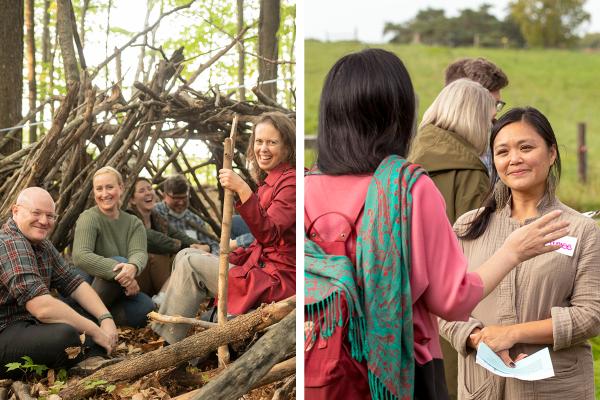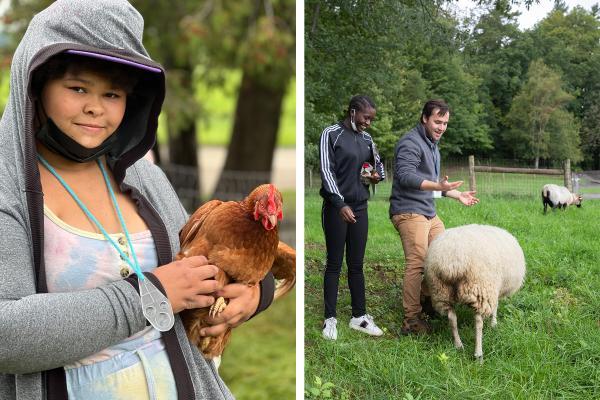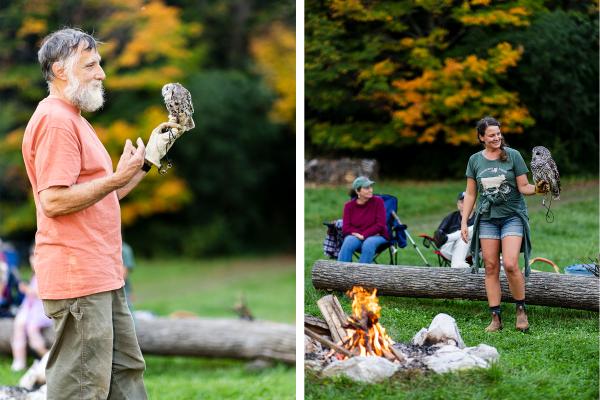Somehow, along the way, Shelburne Farms became transformed into a miracle for Humankind. Education, with Nature at its heart, is perhaps the reason why. -JPM.
A Campus for Learning, Late Fall 2021
In this series, we’re highlighting the many ways Shelburne Farms acts as a campus for learning. As the days get shorter and winter fast approaches, we’re looking back on three ways learners dug in on the farm this fall.
The John Dewey Society
On Saturday, October 9, 23 educators, all members of the John Dewey Society, engaged in a program, “A Day on the Farm: Experiencing Place and Sustainability in Teacher Education,” led by Shelburne Farms educators Jen Cirillo and Aimee Arandia Østensen with University of Vermont professor Simon Jorgenson, a frequent collaborator. UVM played host to the society’s annual conference; Dewey, a pioneer in place-based learning, was born in Burlington, graduated from the University of Vermont, and often explored the farms, forests, and mountains surrounding Lake Champlain.
“Let’s find moments to listen and see what the land is offering to us as we play,” Østensen told the group, which included college faculty and PhD students from around the world. Educators spent the afternoon fostering a sense of curiosity, joy, and wonder by making apple crisp over a fire in the outdoor classroom, building forts and works of natural art, and creating miniature worlds in the forest. Getting their hands dirty in this way allowed them to experience the power of place-based education.
Read more on the University of Vermont College of Education and Social Services’ website: John Dewey Conference highlights the power of experiential and place-based learning.
Burlington High School Horizons Alternative Program
“Where does our food come from?” That simple question served as a guide for students in Burlington High School’s Horizons Alternative Program, who visited the farm in late September. Sixteen students, plus parents and educators, moved through the garden, the farmyard, and eventually to the education space for a lesson on making cheese and pickled veggies. Learning didn’t stop that day. “In learning about fermentation we’re tying it back to science,” explains BHS educator Josefa Austin. “We’re talking about healthy bodies and nutrition. We’re talking about food safety. Really it’s more than I expected, and I’m so happy.” Later in the fall, farm educators visited BHS to continue the conversation and the learning.
At a time when so much learning is happening remotely, “it’s amazing for these students to get out,” shared parent Christine Hrotic. “The umbrella of special needs is huge, but they can all benefit from coming here. Every time they get out and see real, tangible things, it adds to the learning experience. It’s a big, outdoor classroom.”
Learning Around the Campfire
There’s nothing like a campfire overlooking the Farm Barn as the setting sun turns the Green Mountains a radiant golden pink—except, of course, if it includes a visit from live owls, like during our autumn campfire with Outreach For Earth Stewardship (OFES).
Families learned about “owl”-daptations through an amusing game in which we dressed a participant up in a variety of silly things, each representing a fascinating adaptation owls have (i.e. giant sunglasses to represent large eyes, a stethoscope to represent excellent hearing). The group heard the story, “The Owl Who Was Afraid Of The Dark,” by Jill Tomlinson and then met a live Barred Owl and Eastern Screech Owl. (Both of these ambassador owls sustained injuries in the wild that prevent them from hunting sufficiently, and therefore cannot be released.)
Directed by Craig Newman, OFES is a local wildlife education nonprofit specializing in rehabbing injured raptors (think owls, hawks, and falcons) and offering outreach programs that include live raptor ambassadors and hands-on biofacts. Says Newman, “OFES’ mission is to strengthen respect and understanding for wildlife through education. Meeting the wild ambassadors is often people’s first time seeing a live bird-of-prey and we hope it sparks in them the desire to get outside, explore, and find these animals in their natural habitats.”
Campfire programs have been a wonderful way to reintroduce family programming in the time of COVID. They create the perfect setting for families to learn about a variety of topics while having fun and creating memories! Keep an eye on the calendar for more programs with Outreach For Earth Stewardship and other partners.


